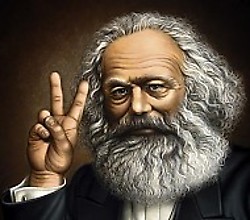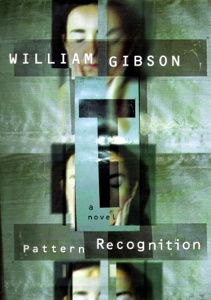First, a little story:
I’ve been a huge fan of SF author Steven Brust since circa 1988 when Taltos came out. (I didn’t know at the time that was not the first in the “Vlad Taltos” series, but it worked out OK.) After becoming a fan, I discovered Brust was a self-described Trotskyist. Being in my teens, early to mid-20s, I really didn’t have any idea what that was but I knew it was somehow connected to GASP! evil Communism! One part of my brain processed this information something like, “Huh, his writing is kick-ass, he seems really cool…perhaps whatever Trotskyism is it’s either a) inconsequential to who he is, or b) it’s not some all-encompassing evilness as my culture leads me to believe.” The other half of my mind processed more like, “LA LA LA LA I’M NOT LISTENING! I SEE NOTHINK! I HEAR NOTHINK! MOVE ALONG, CITIZEN!”
So the cognitive dissonance was dealt with by ardently ignoring it.
Until around 2007 when I started grad school and my first instructor was Dr. William Burling: the most influential professor, and one of the most influential persons, I’d ever met. I had the privilege of being a student of his for three (almost four) fantastic classes. What his greatest influence on me was to introduce me to the idea of questioning culture, society, government, art, everything. Everything is, to a greater or lesser degree, either a product of or a reflector of the socio-economic base of a culture and nearly everything in the culture is in service to those who control the wealth in society. In short, Dr. Burling was a Marxist, and by the fortune of serendipity, happened to come into my life just as I was questioning political structures.
At that time I was moving from Democrat to vague libertarian. It took nearly a year of questioning and study and investigation and debate, but eventually I too became a self-described Marxist. Although I’ve barely scratched the surface still of Marxist theory.
So, at one point as Dr. Burling and I were discussing Marxist theory and SF and fantasy literature, I realized something from the long forgotten recesses of my mind… (See, I kinda stopped reading Mr. Brust’s books by this point–not because I stopped liking them, but I’d pretty much stopped reading for pleasure altogether! I am glad to say I’ve since picked pleasure reading back up and have caught back up with all of Mr. Brust’s “Taltos” books at least.) I recalled that tidbit of info about my favorite fantasy author being a Trotskyist. I asked Dr. Burling, who had introduced me to Stanley Kim Robinson, and China Miéville, and Philip K. Dick, and a Marxist outlook of William Gibson (who, now, I have no idea how you couldn’t read Gibson with a Marxist outlook! My god, the man is postmodern materialist cultural criticism up and down!) if he had read any Steven Brust. He replied, somewhat dismissively that he didn’t have time for any pleasure reading. Then I mentioned Mr. Brust was a Trotskyist and, if I recalled, wrote in a couple of his novels about a peasant uprising in his fantasy world.
Dr. Burling grabbed a pen and asked me what that name was again.
Sadly, Dr. Burling passed away a couple of years later. I never did find out if he started looking into Brust’s writing. Probably not; he was pretty busy, in addition to teaching, editing a book of essays on Kim Stanley Robinson and working with Miéville on a book of criticism about Marxist SF. *sigh* I still feel acute sense of honor of having been able to know the man and learn from him. He changed my entire way of looking at life and I could have missed it if I’d been a couple of years too late.
Anyway, so now that I’m deep in trying to learn and understand Marxist theory, both as it applies to literature and culture, guess what my favorite Trotskyist fantasy author has started doing? He’s reading and commenting on Karl Marx’s seminal work on socio-economics, Das Kapital.* (Volume 1, I believe, which is the one Marx had worked mostly on before he died, while Engels wrote the other volumes.)
What’s really cool is that just before this he had read through and commented on Adam Smith’s The Wealth of Nations (arguably the father of and the manual of modern capitalism). This kicked-ass because not only did I learn something from it (unfortunately I came in rather late), it just goes to show that Brust is interested in exploring all the angles of modern socio-economics and doesn’t just surround himself with material that fits his perceptions or ideologies. That’s certainly a quality to admire and emulate.
 I’m looking forward to reading what he has to say about the tome. And I’m very glad that one side of my brain stopped being a pest and started paying attention. Marxism is not evil, Trotskyism is not evil, communism is not evil. These are just ideas, concepts, ways of investigating and ideas are never evil. They may not be good or practical ideas, but one should never dismiss a way of thinking, a way of investigating, because authority has proclaimed it verboten, taboo, out of bounds. Question everything, especially authority. There’s a reason why they are in power, and a means by which they stay in power.
I’m looking forward to reading what he has to say about the tome. And I’m very glad that one side of my brain stopped being a pest and started paying attention. Marxism is not evil, Trotskyism is not evil, communism is not evil. These are just ideas, concepts, ways of investigating and ideas are never evil. They may not be good or practical ideas, but one should never dismiss a way of thinking, a way of investigating, because authority has proclaimed it verboten, taboo, out of bounds. Question everything, especially authority. There’s a reason why they are in power, and a means by which they stay in power.
* I think he’s moving his blog over to a new location. I’ll try to update this link if I can when it happens.
 I’ve been experiencing a very specific form of nostalgia lately. Coming to mind a lot has been a very particular time of my life, primarily centered around the books I was reading then, and evoking a mood or feeling in me that may be a mix of the feelings I felt then — but most certainly just a nostalgia for that time.
I’ve been experiencing a very specific form of nostalgia lately. Coming to mind a lot has been a very particular time of my life, primarily centered around the books I was reading then, and evoking a mood or feeling in me that may be a mix of the feelings I felt then — but most certainly just a nostalgia for that time.




